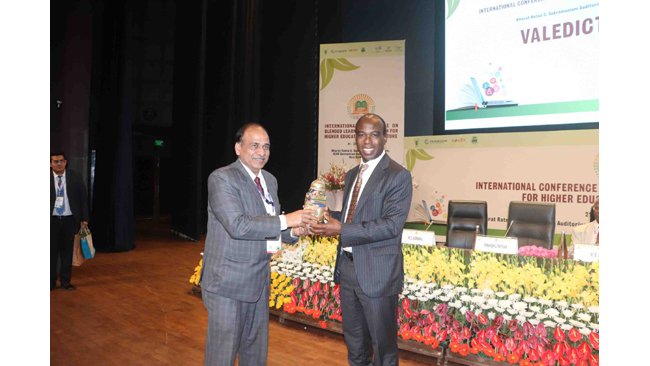
New Delhi, March, 2023.
There is a need to strengthen digital Infrastructure including
digital e-learning content and deployment of emerging immersive technologies
across Agricultural Higher Education Institutions in India. Institutionalizing
a system-wide Digital Capacity Building Program across stakeholders to improve
systemic digital competence, knowledge and skills is also a necessity.
The Delhi Declaration on Modernisation of Agricultural Education
System in alignment with the National
Education Policy issued jointly by The Indian Council of Agricultural Research
(ICAR) and the World Bank highlights the need to incorporate digital
resources and tools for effective and accessible teaching and learning in
Agriculture. It lays emphasis towards creating a renewed and resilient system
for gender-inclusive and sustainable education that will pave the way for the
India’s agriculture education sector. Multidisciplinary technology-facilitated
education should be promoted and the policies on Science, Technology,
Engineering, Agriculture and Mathematics (STEAM) in agricultural higher
education need to be transformed.
The Delhi Declaration was
unveiled on the concluding day of the successful three-day International
Conference on Blended Learning Ecosystem for Higher Education in Agriculture
2023 hosted jointly by the ICAR and the World Bank. The Conference
was held as part of the National Agricultural Higher Education Project’s
(NAHEP) Resilient Agricultural Education System (RAES) development initiative.
Undertaken to strengthen the National Agricultural Education System
in the country, NAHEP is a five-year project initiated in 2018 with equal
contribution of $82.5 million (about Rs 600 crore) each from the World Bank and
the central government. The World Bank loan is to be repaid over 19 years after
a grace period of five years, The purpose of NAHEP is to transform agricultural
higher education. The Blended Learning Platform is part of the project.
Speaking at the valedictory session, Dr RB
Singh, Former President of National Academy of Agricultural Sciences(NAAS) and Chairman,
Agricultural Scientists Recruitment Board (ASRB) said, "By
promoting sustainable development goals through the dissemination of knowledge
and skills, we empower the next generation of agricultural leaders to meet the
challenges of tomorrow. Let us continue to collaborate across borders and
disciplines, to ensure that agriculture remains a force for positive change in
the world."
According to Dr Trilochan Mohapatra, Former Secretary Department
of Agricultural Research and Education (DARE) and Director General, ICAR,
Ministry of Agriculture and Farmers Welfare, “Education is the backbone
of a thriving agricultural sector. Blended learning offers a powerful tool to
bridge the gap between traditional classroom teaching and the demands of a
rapidly changing world.I urge all stakeholders to embrace it and integrate it
into our education systems. It is important for us to embrace new
methods and technologies to strengthen the agriculture education system and
develop a skilled workforce that can contribute to the growth of the
agriculture sector."
Commenting on the success of the conference, Dr RC Agrawal,
Deputy Director General (Agricultural Education) ICAR and National Director,
NAHEP, said, “The 3-day international conference saw around 19 keynote speakers
and panel discussions on six important topics focusing on blended learning in
agriculture. We would like to express our gratitude to the Government of India
for introducing NAHEP and the World Bank for their constant support. The
sustainable development of agriculture depends on the quality and relevance of
education that we provide to the future generation of agricultural
professionals.”
“India’s agricultural sector pays a massive significance on the
country’s economy. Every year, more than 5000 Indian students receive PhDs,
which is more than the rest of the globe. I believe NAHEP is the perfect
example of how opportunities can be provided for vocational education as it has
given platform to another initiative called Resilient Agricultural Education
System (RAES). We will continue working with the ICAR and the Government of
India to disseminate new technologies so that all states of the country can
benefit equally from them,” said Dr
Auguste Tano Kouame, Country Director, the World Bank.
Dr Shailesh Kumar Mishra, Director (Extension), Ministry of
Agriculture and Dr Anuradha Agrawal, National
Coordinator, NAHEP (Component 2 and CAAST) ICAR New Delhi also graced the
valedictory session with their presence.
The event witnessed participation of delegates from 10 countries
along with several academicians, experts, and industry leaders in panel
discussions on topics related to blended learning in higher education for
agriculture. The Conference featured panel discussions on various topics,
including the role of technology in agriculture education, the use of digital
tools for blended learning, the challenges and opportunities of online
learning, and the future of blended learning in agriculture.